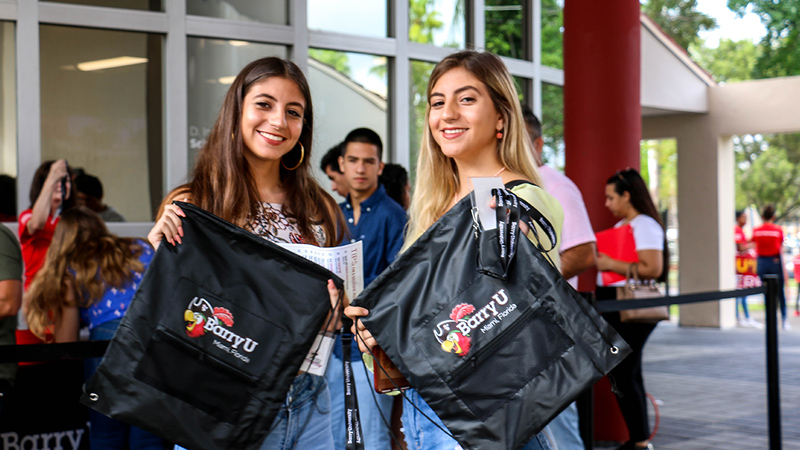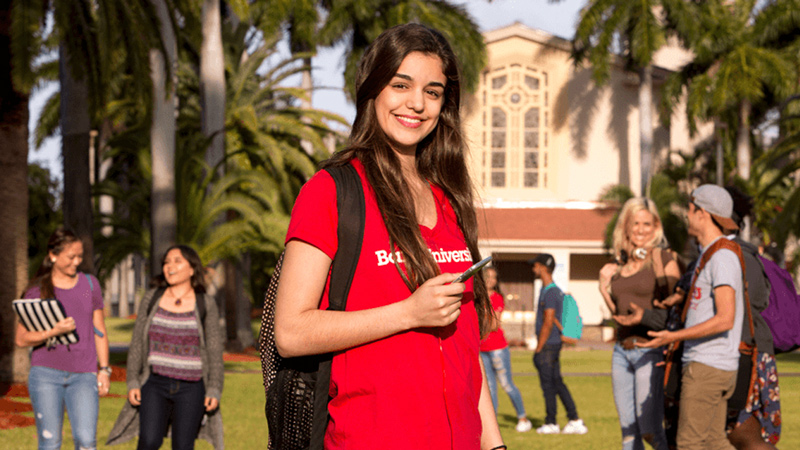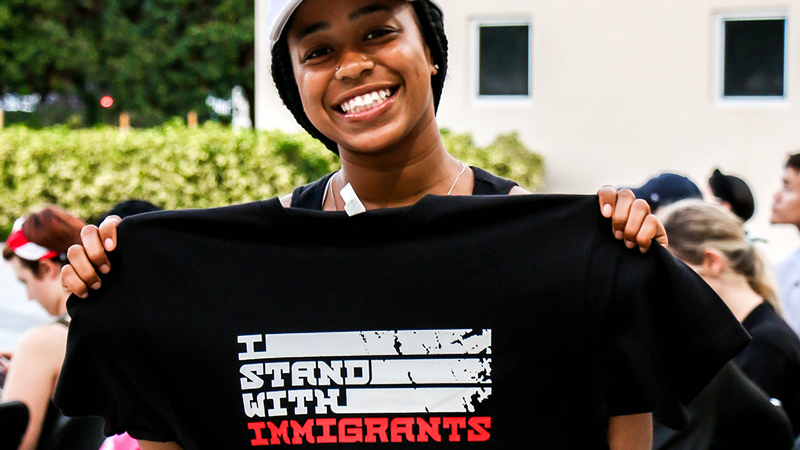Community Engagement News March 20, 2023
BECOMING ADVOCATES OF RACIAL JUSTICE


Terriana Barnes (left), Tamoi Byars, Junior Dameus, and Julien Regala (right) preparing to plant rose bushes on the Rosewood property, which will be the site of a park dedicated to peace and justice. – Photos contributed
A small group of Barry students spent spring break serving and learning about Black history in Florida. And, they reported, their experience was “transformative.”
Undergraduates Terriana Barnes, Tamoi Byars, Junior Dameus, Mia Hunt, Julien Regala, and Valentine Thomas assisted with a project on a property in Rosewood that will be the site of a park dedicated to peace and justice. The park will also memorialize the victims of the Rosewood Massacre of January 1923.
Dr. Marvin Dunn, founder of the Miami Center for Racial Justice, owns the Rosewood property.
Serving alongside the students were Dr. Sarah Riva, assistant professor of history, and two staff members from the Center for Community Service Initiatives (CCSI): Courtney Berrien, associate director, and Gabriel Bouani, coordinator.
Dr. Riva provided historical context for the Rosewood project, throwing light on the atrocities of the Jim Crow era. She told students about the experiences of Black Americans, including the beatings and lynchings to which they were subjected.
As part of Alternative Spring Break (March 4–10), the students and CCSI staff members also visited the state capitol as well as historic sites in Montgomery, Alabama.
In Tallahassee, the students and staff supported the work of the Florida Student Power Network and met with legislators at the capitol. An affiliate of Florida Rising, the Florida Student Power Network seeks to “harness the power of students and youth to create tangible change in our communities and our country.”
The group spoke with the lawmakers about the importance of being able to learn Black history in Florida. Among the legislators was State Representative Felicia Robinson, a Barry alumna. Ms. Robinson has been a member of the Florida House of Representatives since November 2020.

Alternative Spring Break included a day in Rosewood. Once a thriving Black community, Rosewood is the site of a massacre that occurred 100 years ago.

The group meets with Felicia Robinson, a member of the Florida House of Representatives from the 102nd district. A Barry alumna, Ms. Robinson assumed office in November 2020.

Members of the group pictured outside the Florida capitol are (from left) Junior Dameus, Julien Regala, Terriana Barnes, Tamoi Byars, Mia Hunt, Gabriel Bouani, and Valentine Thomas.

Students from Barry join a vigil at Dexter King Memorial Baptist Church in Montgomery. In the foreground, Julien Regala (right) lights a candle in memory of persons killed while incarcerated in Alabama prisons.


Left: At the National Memorial to Peace and Justice in Montgomery, Terriana Barnes walks beneath monuments to racial lynching victims. Right: Mia Hunt and Valentine Thomas take in civil rights history at the Rosa Parks Museum. – Photos contributed
The trip to Montgomery included various stops in Florida communities that were involved in the Equal Justice Initiative’s (EJI) Community Remembrance Project. Through the project, EJI collaborates with communities to memorialize documented victims of racial violence and foster meaningful dialogue about race and justice.
In Montgomery, the Barry group visited the EJI’s Legacy Museum and National Memorial to Peace and Justice. The visitors appreciated the vision and work of EJI founder Bryan Stevenson.
The Legacy Museum uses interactive media, sculpture, videography, and exhibits to immerse visitors in the sights and sounds of the slave trade, racial terrorism, the Jim Crow South, and the world’s largest prison system. And the National Memorial, which commemorates the victims of racial lynchings, is regarded as a sacred space for truth-telling and reflection about racial terror in the United States.
The group also visited the Rosa Parks Museum on Troy University’s downtown Montgomery campus. The museum serves as a memorial to the life of civil rights icon Rosa Parks and the lessons of the Montgomery Bus Boycott that brought racial integration to transportation and international attention to civil rights.
In addition, the students and staff joined a vigil at Dexter King Memorial Baptist Church, where Dr. Martin Luther King, Jr. served as pastor during the Montgomery Bus Boycott. That event, staged just steps away from the Alabama state capitol, sought to raise awareness about abuses in the state’s criminal justice system.
The students said they learned a lot from their Alternative Spring Break experience. And they called it “transformative.” The seven-day experience prepared them to become advocates of racial justice, the students agreed.
Community Service Placements Still Available to Students Eligible for Federal Work-Study

Community service positions are still available to students who are eligible for Federal Work-Study (FWS). Students who accept such positions are enrolled in the Barry Service Corps.
The Barry Service Corps is a civic engagement initiative that supports students in applying civic and academic learning to real-world problems. While serving the community through nonprofit organizations, educational institutions, and local government agencies, members develop interpersonal, teamwork, and other career-related skills.
The CCSI manages FWS Community Service in partnership with the Department of Human Resources and the Office of Financial Aid. The CCSI’s approach to the program is based on interdivisional and campus–community collaboration and involves the full integration of FWS Community Service into Barry’s strategic plan for community engagement. As part of the plan, the CCSI enrolls all participating students in the Barry Service Corps.
For further information, contact Emmanuel Ikpuri, program facilitator for FWS Community Service, via email: bsc@barry.edu.
Faculty May Submit Applications for Service-Learning Designation at Any Time

Courses that meet specific criteria are labeled “service-learning” in the course schedule and are noted on students’ transcripts.
The Center for Community Service Initiatives (CCSI) is inviting faculty members whose courses include a service-learning component to apply for the “SL” designation. Applications may be submitted at any time throughout the semester.
Service-learning is a teaching and learning strategy that integrates relevant community service with course work and critical reflection to enrich the learning experience, foster social responsibility and civic engagement, and strengthen communities.
Sections of courses, internships, practicum assignments, field education, capstones, community-based research, and similar community-focused or community-based experiences may be designated as service-learning.
“Designating courses as service-learning promotes deep integration of thoughtfully organized community service into the curriculum and high standards of service-learning practice,” according to a statement from the CCSI. “Service-learning courses demonstrate the value of applied learning, student engagement with the community, and critical reflection.”
For detailed information on the service-learning designation requirements, contact Dr. Glenn Bowen in the CCSI via email at gbowen@barry.edu.



The Barry Urban Garden (BUG) is a community agriculture initiative that addresses food insecurity in Miami neighborhoods. Produce from the BUG is distributed through Miami Community Fridge. Recently, plants were added to the garden to attract butterflies. – Photos by Mia Hunt

Community Engagement News is a publication of the Center for Community Service Initiatives.
Email: service@barry.edu │ Facebook: barryccsi │ Twitter: @barryccsi │ Instagram: @barryccsi




















